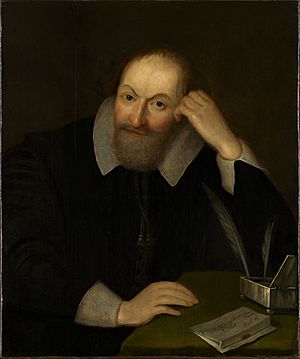Henry Wotton facts for kids
Quick facts for kids
Sir Henry Wotton
|
|
|---|---|

Sir Henry Wotton, Government Art Collection, London.
|
|
| Chief Secretary for Ireland | |
| In office 1599–1599 |
|
| Preceded by | Philip Williams |
| Succeeded by | Francis Mitchell |
| Personal details | |
| Born | 30 March 1568 |
| Died | December 1639 (aged 71) |
Sir Henry Wotton (born March 30, 1568 – died December 1639) was an English writer, diplomat, and politician. He was a member of the English Parliament in 1614 and 1625. He is famous for a saying he made in 1604 while on a trip to Augsburg: "An ambassador is an honest gentleman sent to lie abroad for the good of his country." This quote meant that a diplomat might sometimes need to hide the truth or use clever words to help their country.
Contents
Life Story
Early Life and Education
Henry Wotton was born at Bocton Hall in Kent. His father was Thomas Wotton. Henry was the youngest brother of Edward Wotton, 1st Baron Wotton. He went to Winchester College and then to New College, Oxford. He later moved to Queen's College, graduating in 1588.
While at Oxford, he became friends with Alberico Gentili, a law professor, and John Donne, a famous poet. Henry was very interested in science. He even gave lectures about the eye. He continued to enjoy science experiments throughout his life.
Travels and Early Career
After his father died, Henry Wotton traveled around Europe for about six years. He visited places like Vienna, Venice, and Rome. He also spent time in Geneva. During his travels, he sent information back to Robert Devereux, 2nd Earl of Essex, an important English nobleman.
When he returned to England, he started working for the Earl of Essex. He helped gather information about other countries.
Diplomat for King James
In 1602, Henry Wotton was living in Florence, Italy. He learned about a plan to harm James VI of Scotland, who was about to become King of England. Wotton was chosen to warn King James. He traveled to Scotland in secret, pretending to be someone else. King James was very grateful and later made him a knight.
King James offered Wotton a job as an ambassador. Wotton chose to represent England in Venice. He worked there for most of the next twenty years. He helped the leader of Venice, called the Doge, with political issues. He also worked closely with Paolo Sarpi, who was writing a history of the Council of Trent.
A Famous Saying
In 1611, a scholar named Caspar Schoppe wrote a book criticizing King James. In this book, he brought up a famous saying by Wotton. Years earlier, Wotton had written in a friend's book: "An ambassador is an honest man sent to lie abroad for the good of his country." The original Latin version of this saying did not have the double meaning that it gained in English. This caused some trouble for Wotton, as it made him and the king look bad. Wotton explained himself to the king and eventually regained his favor.
Later Life and Eton College
In 1614, Wotton became a Member of Parliament for Appleby. He continued his diplomatic work, including a special trip to Emperor Ferdinand II to help King James's daughter, Elizabeth of Bohemia. Wotton cared deeply for this princess and wrote beautiful poems about her. The emperor gave him a valuable jewel, but Wotton gave it away because he did not want gifts from an enemy of the Bohemian queen.
After his time in Venice, he returned to London in 1624. He became the provost of Eton College, a famous school. This job did not solve all his money problems. He was even arrested once for debt. In 1625, he was elected as a Member of Parliament for Sandwich.
He received a pension later in life and was asked to write a history of England. He enjoyed his role at Eton and often entertained friends. His closest friends included Izaak Walton, who wrote a famous book about fishing, and John Hales. Wotton and Walton often went fishing together near the Thames river.
Sir Henry Wotton died in December 1639 and was buried at Eton College.
His Writings
Henry Wotton wrote several poems. Two of his most famous poems are "O his Mistris, the Queen of Bohemia" and "The Character of a Happy Life." He also wrote a well-known epitaph (a short text on a tombstone) for his nephew's widow, Elizabeth Apsley: "He first deceased, she for a little tried to live without him, liked it not, and died."
During his life, he published two main works:
- The Elements of Architecture (1624): This book was his translation of an older work by Marcus Vitruvius Pollio, a Roman architect. It includes the famous quote, "Well building hath three conditions: firmness, commodity, and delight." This means good buildings should be strong, useful, and beautiful.
- A Latin speech to the king (1633).
After he died, a collection of his writings and a biography by his friend Izaak Walton were published in 1651. This book was called Reliquiae Wottonianiae.
 | Isaac Myers |
 | D. Hamilton Jackson |
 | A. Philip Randolph |

